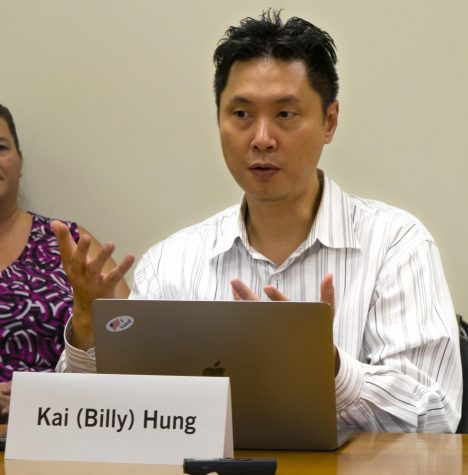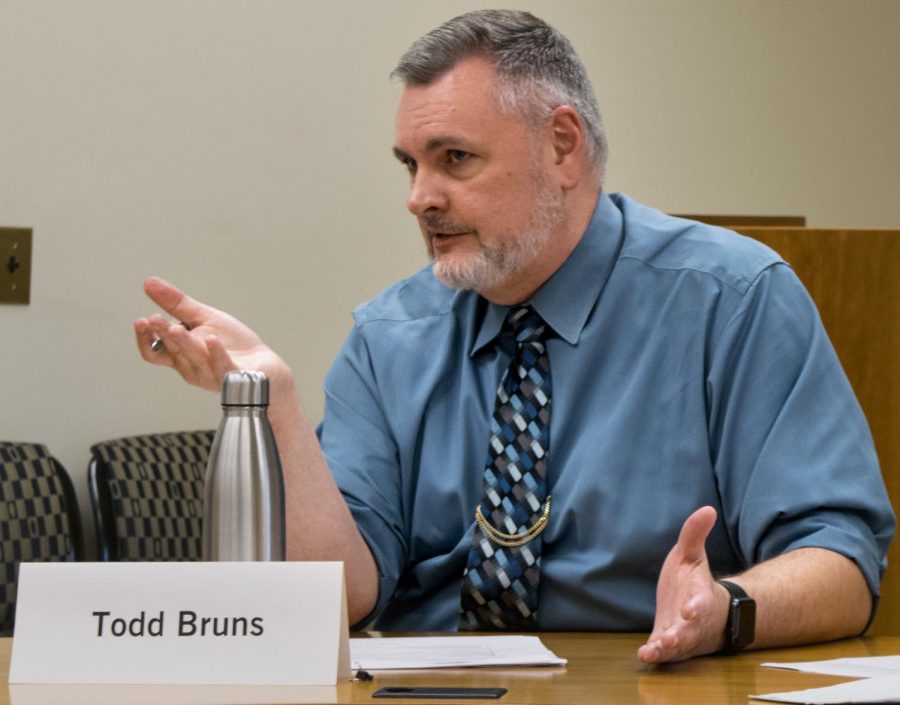Faculty Senate discusses Unit B involvement in senate
Brooke Schwartz | The Daily Eastern News
Todd Bruns is the Faculty Senate chair and the scholarly communication librarian and institutional director. The Faculty Senate met Tuesday at 2 p.m. in room 4440 of the Mary J Booth Library.
October 2, 2018
The Faculty Senate met on Tuesday to discuss Unit B faculty members serving on the senate and the possible combination of the Academic Program Elimination Reorganization Committee and the Sanction Termination Hearing Committee.
In the senate’s Sept. 4, 2018 meeting, they first discussed Unit B faculty’s role on the senate.
Annually contracted faculty, a part of the overall Unit B faculty, make up from one-fourth to one-third of almost every department on campus, with some departments employing more or less ACFs.
Although these Unit B faculty members are currently allowed to serve in any position on the senate, there has been historically no involvement from Unit Bs for many reasons.
One reason discussed at that Sept. 4 meeting is the lack of incentive Unit B faculty receive compared to Unit A faculty, who are required to serve on campus.

Billy Hung is a member of the Faculty Senate and a biological sciences professor. The senate looked at Unit B faculty participation in Faculty Senate and the possible combination of APERC and STHC.
Despite this lack of contractual obligation, Todd Bruns, Faculty Senate chair and scholarly communication librarian and institutional repository director, said that in his visits to various departments around campus, when asked, Unit B faculty said they have interest in being a part of the senate.
In this spirit, Bruns suggested making one of the current senate positions a dedicated Unit B position in an effort to better invite those members to serve.
Education professor Dawn VanGunten said she is unsure of the point of a dedicated position specifically for Unit B faculty.
“I don’t understand; if (Unit B) are eligible to run for all of the positions, why does there need to be a dedicated spot?” VanGunten said. “The invitation is for us to include them in this process, to recruit them, not to dedicate a seat to them.”
Bruns said having that dedicated seat would be a stronger invitation.
“There’s something about that there is a Unit B seat that seems to really resonate with them. (VanGunten is) right, (Unit B) could have run any time, and they haven’t, they never have, and I point that out when I talk to the departments,” Bruns said. “But what I’m getting back is, they feel like a Unit B seat is an invitation to have a Unit B voice, they feel like there’s something about (a dedicated seat) that seems to formalize that.”
Nursing professor Sue Gosse said the senate is getting to a bigger problem with these discussions.
“I think the problem we’re confronting is that (the senate is) an incomplete voice of the faculty if we don’t have the representation, and yeah, it might be a matter of recruitment, it might be just a change in language,” Gosse said. “I think we’re just acknowledging that, if we’re going to have a shared governance, we do need (Unit B) voices.”
Another problem the senate brought up is many Unit B faculty may be interested, but they might just not know that they are able to serve on the senate.
The senate’s executive committee will draw up more concrete plans about a possible seat dedicated to Unit B faculty on the senate.
The possible resolution will be discussed at the senate’s Oct. 16 meeting.
The senate also discussed two possible models to reduce the number of faculty that serve on APERC and STHC.
Currently, the committees are separate and are called to meet rarely, senators said.
The first model discussed would create one pool of faculty members who would technically be on both committees, and APERC and STHC would be populated from that pool whenever called.
The second model would involve adding APERC duties to the Council on Academic Affairs, while giving the STHC duties to the senate.
All members said they agree that there were pros and cons to both plans.
Economics professor Teshome Abebe said he supported the first model more and that he was worried the second model might be too messy or might allow for these committees to become more political.
Steve Brantley, head of reference and institutional services, said the second model makes more sense to him due to the fact that the senate and the CAA are already staffed, so it would not mean picking faculty members who might not have expertise from the pool of members.
Health administration instructor Joan McCausland said that, having served on APERC, she was worried about the CAA dealing with the intensive time that that committee requires.
The discussion was tabled to give senators more time to consider the options and time to consult with CAA members.
The panther statue, which was approved by Student Government last year, is currently being worked on and will hopefully be up in time for this year’s graduation, Carson Gordon, member of Student Government, said.
Gordon also said that Student Government will need to redo their vote for the position of Student Speaker of the Senate after the organization violated their bylaws at Wednesday’s meeting by voting with paper slips.
Brooke Schwartz can be reached at 581-2812 or at bsschwartz@eiu.edu.











![[Thumbnail Edition] Junior right-handed Pitcher Lukas Touma catches at the game against Bradley University Tuesday](https://www.dailyeasternnews.com/wp-content/uploads/2025/03/MBSN_14_O-e1743293284377-1200x670.jpg)

![[Thumbnail Edition] Eastern Illinois University baseball senior utility player Tyler Castro fields a ground ball during the team's first intrasquad scrimmage of the season on Jan. 31.](https://www.dailyeasternnews.com/wp-content/uploads/2025/03/BB_01_O-e1742874760130-1-e1742907504722-1200x911.jpg)
![[Thumbnail Edition] Senior Foward Macy McGlone, getsw the ball and gets the point during the first half of the game aginst Western Illinois University,, Eastern Illinois University Lost to Western Illinois University Thursday March 6 20205, 78-75 EIU lost making it the end of their season](https://www.dailyeasternnews.com/wp-content/uploads/2025/03/WBB_OVC_03_O-1-e1743361637111-1200x614.jpg)





































![The Weeklings lead guitarist John Merjave [Left] and guitarist Bob Burger [Right] perform "I Am the Walrus" at The Weeklings Beatles Bash concert in the Dvorak Concert Hall on Saturday.](https://www.dailyeasternnews.com/wp-content/uploads/2025/03/WL_01_O-1200x900.jpg)
![The team listens as its captain Patience Cox [Number 25] lectures to them about what's appropriate to talk about through practice during "The Wolves" on Thursday, March 6, in the Black Box Theatre in the Doudna Fine Arts Center in Charleston, Ill.](https://www.dailyeasternnews.com/wp-content/uploads/2025/03/WolvesPre-12-1200x800.jpg)




















